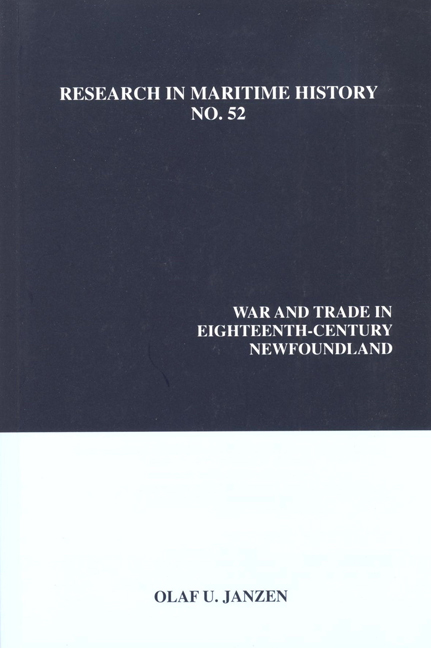Book contents
- Frontmatter
- Table of Contents
- About the Author
- Introduction
- “‘A World Embracing Sea:’ The Oceans as Highway, 1604-1815”
- “Of Consequence to the Service:' The Rationale behind Cartographic Surveys in Early Eighteenth-Century Newfoundland”
- “The Problem of Piracy in the Newfoundland Fishery in the Aftermath of the War of the Spanish Succession”
- “A Scottish Sack Ship in the Newfoundland Trade, 1726-1727”
- “'Une petite Republique' in Southwestern Newfoundland: The Limits of Imperial Authority in a Remote Maritime Environment”
- “The Illicit Trade in English Cod into Spain, 1739-1748”
- “Un Petit Dérangement: The Eviction of French Fishermen from Newfoundland in 1755”
- “The French Raid upon the Newfoundland Fishery in 1762: A Study in the Nature and Limits of Eighteenth-Century Sea Power”
- “Showing the Flag: Hugh Palliser in Western Newfoundland, 1763-1766”
- “The Royal Navy and the Interdiction of Aboriginal Migration to Newfoundland, 1763-1766”
- “The Royal Navy and the Defence of Newfoundland during the American Revolution”
- “The American Threat to the Newfoundland Fisheries, 1776-1777”
- Appendix
“‘A World Embracing Sea:’ The Oceans as Highway, 1604-1815”
- Frontmatter
- Table of Contents
- About the Author
- Introduction
- “‘A World Embracing Sea:’ The Oceans as Highway, 1604-1815”
- “Of Consequence to the Service:' The Rationale behind Cartographic Surveys in Early Eighteenth-Century Newfoundland”
- “The Problem of Piracy in the Newfoundland Fishery in the Aftermath of the War of the Spanish Succession”
- “A Scottish Sack Ship in the Newfoundland Trade, 1726-1727”
- “'Une petite Republique' in Southwestern Newfoundland: The Limits of Imperial Authority in a Remote Maritime Environment”
- “The Illicit Trade in English Cod into Spain, 1739-1748”
- “Un Petit Dérangement: The Eviction of French Fishermen from Newfoundland in 1755”
- “The French Raid upon the Newfoundland Fishery in 1762: A Study in the Nature and Limits of Eighteenth-Century Sea Power”
- “Showing the Flag: Hugh Palliser in Western Newfoundland, 1763-1766”
- “The Royal Navy and the Interdiction of Aboriginal Migration to Newfoundland, 1763-1766”
- “The Royal Navy and the Defence of Newfoundland during the American Revolution”
- “The American Threat to the Newfoundland Fisheries, 1776-1777”
- Appendix
Summary
From the passing of the Elizabethan Age at the beginning of the seventeenth century to the end of the Napoleonic wars just after the end of the eighteenth century, European commerce began to flow along oceanic highways that were truly global in extent. It was a period of history that encompassed an enormous number of experiences, developments and nationalities. Just in European terms alone, the “Oceans as Highways” embraced the Dutch, French, Spanish, Portuguese and English maritime experiences, as well as those of Sweden, Denmark, Russia, the United States and a host of smaller nationalities, city-states and principalities. It was an age characterized by what historians today refer to as “mercantilism” in which maritime trade was dominated by a rapidly expanding volume of luxury and consumer commodities such as sugar, coffee, tobacco, fish and grain. It was equally an age when oceanic highways permitted the rapid growth of the traffic in African slaves to the New World and when European powers struggled increasingly – not only on land but also on the sea itself – to control and use the wealth that travelled on these oceanic highways. To say something reasonably coherent about such a diversity of material within a brief chapter is a daunting challenge. Therefore, I will explore several themes within the narrower framework of the Newfoundland fishery, fisher society and fish trade during the eighteenth century. Like so many other oceanic activities, this is one in which all aspects of oceanic commerce are manifest: oceans as highways; the struggle for control of the commerce on those highways; the national and ethnic diversity of the shipping, markets and individuals engaged in oceanic commerce; and above all the strategies and considerations necessary to succeed in oceanic commerce. Through this admittedly narrow window into the past, it is possible to explore the way in which the oceans functioned as highways for ships, people and commodities during the seventeenth and eighteenth centuries.
Before the seventeenth century, Europeans had already developed significant maritime highways as they engaged in commerce within and beyond Europe. The Baltic, the Mediterranean, the English Channel and the Atlantic seaboard had all become busy with shipping and trade. During the sixteenth century, Europeans exploded beyond the confines of their homelands as they extended their reach to Africa, Asia and the New World.
- Type
- Chapter
- Information
- War and Trade in Eighteenth-Century Newfoundland , pp. 7 - 16Publisher: Liverpool University PressPrint publication year: 2013

